Search the Special Collections and Archives Portal
Search Results

Photograph of a United States Air Force plane in a hangar at Nellis Air Force Base, Nevada, January 1982
Date
1982-01
Archival Collection
Description
A U.S. Air Force Thunderbirds plane in a hangar at Nellis Air Force Base after a fatal Thunderbirds crash in Indian Springs, Nevada. Site Name: Nellis Air Force Base (Nev.)
Image
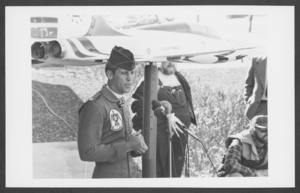
Photograph of Captain Dale Cooke speaking to the press at Nellis Air Force Base, Nevada, January 20, 1982
Date
1982-01-20
Archival Collection
Description
Captain Dale Cooke speaks to the press at Nellis Air Force Base after a fatal U.S. Air Force Thunderbirds crash in Indian Springs, Nevada. Site Name: Nellis Air Force Base (Nev.)
Image
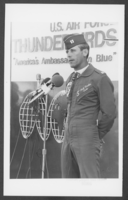
Photograph of Captain Dale Cooke speaking to the press at Nellis Air Force Base, Nevada, January 20, 1982
Date
1982-01-20
Archival Collection
Description
Captain Dale Cooke speaks to the press at Nellis Air Force Base after a fatal U.S. Air Force Thunderbirds crash in Indian Springs, Nevada. Site Name: Nellis Air Force Base (Nev.)
Image
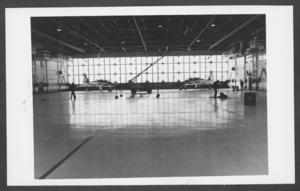
Photograph of planes in a United States Air Force Thunderbirds hangar at Nellis Air Force Base, Nevada, January 1982
Date
1982-01
Archival Collection
Description
Planes in a U.S. Air Force Thunderbirds hangar at Nellis Air Force Base after a fatal Thunderbirds crash in Indian Springs, Nevada. Site Name: Nellis Air Force Base (Nev.)
Image
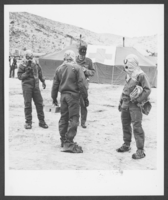
Photograph of airmen checking chemicals during war games at Nellis Air Force Base, Nevada, circa 1980
Date
1977 to 1983
Archival Collection
Description
U.S. Air force airmen, wearing protective clothing and masks, checking chemicals during war games at Nellis Air Force Base, Nevada. Site Name: Nellis Air Force Base (Nev.)
Image
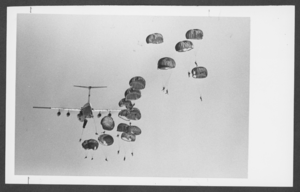
Photograph of airmen participating in Red Flag aerial combat training over Nellis Air Force Base, Nevada, December 3, 1979
Date
1979-12-03
Archival Collection
Description
U.S. Air Force airmen parachuting from a military plane during Red Flag aerial combat training over Nellis Air Force Base, Nevada.
Image
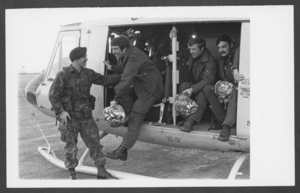
Photograph of Royal Air Force officers as they arrive at Nellis Air Force Base, Nevada, December 25, 1979
Date
1979-12-25
Archival Collection
Description
Royal Air Force officers greeted by Senior Airman Dale Prentice (left). The trio are crew members of a British Vulcan Bomber taking part in Red Flag combat training at Nellis Air Force Base, Nevada. Site Name: Nellis Air Force Base (Nev.)
Image
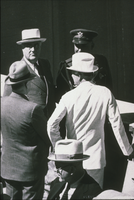
Slide of Franklin D. Roosevelt, Harold Ickes, and Key Pittman at Hoover Dam September 30, 1935
Date
1935-09-30
Archival Collection
Description
Black and white image of President Roosevelt, his aide Harold Ickes, and Senator Key Pittman at Hoover Dam's dedication. Note: Boulder Dam was officially renamed Hoover Dam in 1947.
Image
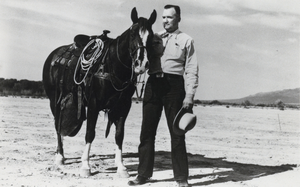
Photograph of George Malone posing beside Gimick the horse, Nevada, circa 1947-1959
Date
1947 to 1959
Archival Collection
Description
Senator George Malone standing next to Gimick the horse in the desert in Nevada. The postcard caption reads: "Senator Malone and "Gimick," one of the top roping and dogging horses west of the Rockies. Gimick has to stand on his tiptoes to be 14 " hands high-weighs 1,050 pounds and on the "getaway" the third jump he is going as fast as he is ever going to go. The Senator gets a calf about every second or third throw."
Image
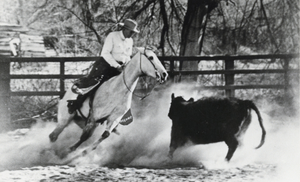
Photograph of George Malone riding his horse PAYDIRT, circa 1947-1959
Date
1947 to 1959
Archival Collection
Description
Senator George Malone riding his horse PAYDIRT in what could possibly be Nevada. The postcard caption reads, "Senator Malone up on his "Cutting horse PAYDIRT" - the little Quarter horse mare stands 14 " hands high and weighs 1,050 pounds. PAYDIRT- a top competitor in any company- is cream colored buckskin with blue stripe down her back."
Image
Pagination
Refine my results
Content Type
Creator or Contributor
Subject
Archival Collection
Digital Project
Resource Type
Year
Material Type
Place
Language
Records Classification
